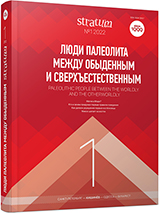Становление социальных норм в антропогенезе: опыт номологического объяснения
Nomological Explanation of the Formation of Social Norms in Anthropogenesis: a Trial
Author(s): Nikolai Sergeyevich RozovSubject(s): Archaeology, Social history, Philosophy of Science, Prehistory
Published by: Издательский дом Stratum, Университет «Высшая антропологическая школа»
Keywords: anthropogenesis; social norms; normativity; social interaction; nomological approach; Carl Hempel; theoretical hypothesis; empirical hypothesis;
Summary/Abstract: The paper is devoted to conditions for the appearance of the first social norms (rules of behavior, including prescriptions and prohibitions) in the groups of early hominids, presumably by 3—2.5 million years ago. The author uses theoretical ideas about objective group concerns and the structures that support them, about normativity as a multi-component social phenomenon, about the ritual mechanism of attitudes formation, about interiorization, as well as modern ideas about the nature of life and social interactions of ancient hominids, based on the data of archeology and paleoclimatology. To explain the normativity, the classical scheme of the nomological explanation of Carl Hempel is used. This approach has been expanded, since justification is required not only by an empirical hypothesis about the specific conditions for the occurrence of a phenomenon in a certain space and time, but also by the theoretical (“universal” in Hempel’s terms) hypothesis itself. It is shown that this approach opens opportunities for conducting a variety of studies with observations, field and computer experiments, as well as a methodological integration of already conducted studies of this kind, which are especially actively used in dealing with the origin of language problem.
Journal: Stratum plus. Археология и культурная антропология
- Issue Year: 2022
- Issue No: 1
- Page Range: 89-100
- Page Count: 12
- Language: Russian
- Content File-PDF

